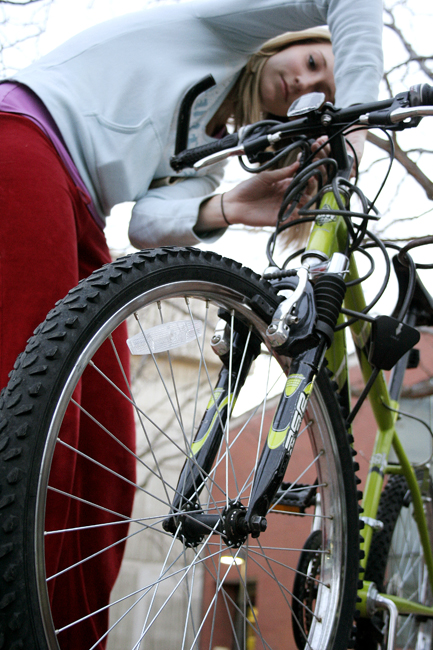USU supporting alternative forms of transportation
Car-Free Fridays is a campaign designed to promote clean air and healthy behaviors through sustainable forms of transportation such as biking, walking and public transportation, said Caroline Shugart, USU’s wellness coordinator.
This campaign, which took off at the beginning of fall semester, is probably the most simple concept USU patrons will ever have laid at their feet: instead of taking your car to work or school every day, find a different, more eco-friendly way of getting there, she said.
Shugart created the Car-Free Fridays program after she was involved in the Bike-to-Work Campaign last June. During that experience, Shugart said she realized how wasteful it is to drive when the size of Cache Valley makes it easy to get around without a vehicle. She also felt this was something that should be consciously pursued more than once a year.
“I thought it would be great to have people commit to leaving the car in the garage for just one day a week, that seemed doable,” she said.
And since the program’s inception many students and faculty members have sent Shugart stories telling of their transition from a car commute lifestyle to a more eco-friendly commute lifestyle.
An excerpt from one of the stories read:
“Since June I have been riding my bike to work nearly every day. I was disgusted with gas prices and really needed to get some physical exercise. I was surprised to discover that biking only really takes me about five minutes longer than driving, parking and walking to my office,” wrote Sarah Ohms from child care resource and referral.
However, Car-Free Fridays doesn’t mean people must walk or bike to work. Shugart said this program also promotes the use of public transportation, something that all Cache Valley residents are blessed with simply for living in the area. Both the LTD and CVTD have routes all over the valley at no cost to the rider.
Shugart said another option many USU patrons are taking is to carpool. This way people who would rather drive can do so, she said, but are only using one car instead of four or five.
Ryan Keepers, junior majoring in English and one of the few students who bike to and from campus every day, said very few people use these alternative forms of transportation, especially the city bus. Keepers attributes this behavior to the culture of the 21st century, where everyone has somewhere to be and they have to get there as fast as possible.
“We have a fantastic public transportation system,” he said. “However, very few people use it because they are so use to hoping in their car and being somewhere in three minutes, and the idea of walking and taking 15 or 20 minutes seems absolutely absurd to them.”
Keepers said these other forms of transportation do a lot to help the environment and an individual person. As well, riding a bike or walking gives a person the chance to appreciate the beauty of Cache Valley, something that is given up when you are stuck in a car.
“I think people benefit psychologically from getting out and taking the time to get somewhere and enjoying themselves. Having that time, whether alone or with someone else, is something a lot of people skip out on,” Keepers said.
However, Keepers said it does take dedication to keep up the lifestyle of an eco-friendly commuter. This means often having to wake up earlier to reach a destination on time, or pushing through the nasty winters notorious in Cache Valley. But he also said the extra time to himself is nice, and the winters aren’t so bad as long as he layers himself.
Shugart said it is imperative that Cache Valley residents find alternative forms of transportation because a good portion of the CO2 emissions in the valley are directly related to the vast amount of driving that takes place. All of the car emissions, along with other pollution, get trapped in the valley’s bowl shaped structure and causes the smoggy hue that sits over the city. This inversion is most noticeable in the winter and can have adverse affects on the environment and individual people’s health.
“I am hoping that employees and students (at USU) will think about this before they get into their car, that the air quality is directly impacted by our using cars,” Shugart said. “If people got out of their cars and appreciated where we live everything would change. Our cars isolates us from the reality of clean air.”
–greg.boyles@aggiemail.usu.edu

